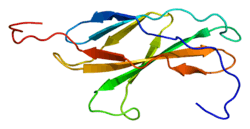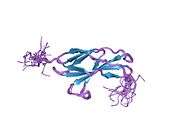EPH receptor B1
| View/Edit Human | View/Edit Mouse |
Ephrin type-B receptor 1 is a protein that in humans is encoded by the EPHB1 gene.[3][4]
Function
Ephrin receptors and their ligands, the ephrins, mediate numerous developmental processes, particularly in the nervous system. Based on their structures and sequence relationships, ephrins are divided into the ephrin-A (EFNA) class, which are anchored to the membrane by a glycosylphosphatidylinositol linkage, and the ephrin-B (EFNB) class, which are transmembrane proteins. The Eph family of receptors are divided into 2 groups based on the similarity of their extracellular domain sequences and their affinities for binding ephrin-A and ephrin-B ligands. Ephrin receptors make up the largest subgroup of the receptor tyrosine kinase (RTK) family. The protein encoded by this gene is a receptor for ephrin-B family members.[4]
Interactions
EPH receptor B1 has been shown to interact with:
References
- ↑ "Human PubMed Reference:".
- ↑ "Mouse PubMed Reference:".
- ↑ Tang XX, Biegel JA, Nycum LM, Yoshioka A, Brodeur GM, Pleasure DE, Ikegaki N (1995). "cDNA cloning, molecular characterization, and chromosomal localization of NET(EPHT2), a human EPH-related receptor protein-tyrosine kinase gene preferentially expressed in brain". Genomics. 29 (2): 426–37. doi:10.1006/geno.1995.9985. PMID 8666391.
- 1 2 "Entrez Gene: EPHB1 EPH receptor B1".
- ↑ Stein E, Lane AA, Cerretti DP, Schoecklmann HO, Schroff AD, Van Etten RL, Daniel TO (Mar 1998). "Eph receptors discriminate specific ligand oligomers to determine alternative signaling complexes, attachment, and assembly responses". Genes Dev. 12 (5): 667–78. doi:10.1101/gad.12.5.667. PMC 316584
 . PMID 9499402.
. PMID 9499402. - ↑ Han DC, Shen TL, Miao H, Wang B, Guan JL (Nov 2002). "EphB1 associates with Grb7 and regulates cell migration". J. Biol. Chem. 277 (47): 45655–61. doi:10.1074/jbc.M203165200. PMID 12223469.
- ↑ Stein E, Huynh-Do U, Lane AA, Cerretti DP, Daniel TO (Jan 1998). "Nck recruitment to Eph receptor, EphB1/ELK, couples ligand activation to c-Jun kinase". J. Biol. Chem. 273 (3): 1303–8. doi:10.1074/jbc.273.3.1303. PMID 9430661.
Further reading
- Flanagan JG, Vanderhaeghen P (1998). "The ephrins and Eph receptors in neural development". Annu. Rev. Neurosci. 21: 309–45. doi:10.1146/annurev.neuro.21.1.309. PMID 9530499.
- Zhou R (1998). "The Eph family receptors and ligands". Pharmacol. Ther. 77 (3): 151–81. doi:10.1016/S0163-7258(97)00112-5. PMID 9576626.
- Abrahamson DR, Robert B, Hyink DP, St John PL, Daniel TO (1998). "Origins and formation of microvasculature in the developing kidney". Kidney Int. Suppl. 67: S7–11. doi:10.1046/j.1523-1755.1998.06702.x. PMID 9736245.
- Holder N, Klein R (1999). "Eph receptors and ephrins: effectors of morphogenesis". Development. 126 (10): 2033–44. PMID 10207129.
- Wilkinson DG (2000). "Eph receptors and ephrins: regulators of guidance and assembly". Int. Rev. Cytol. 196: 177–244. doi:10.1016/S0074-7696(00)96005-4. PMID 10730216.
- Xu Q, Mellitzer G, Wilkinson DG (2000). "Roles of Eph receptors and ephrins in segmental patterning". Philos. Trans. R. Soc. Lond., B, Biol. Sci. 355 (1399): 993–1002. doi:10.1098/rstb.2000.0635. PMC 1692797
 . PMID 11128993.
. PMID 11128993. - Wilkinson DG (2001). "Multiple roles of EPH receptors and ephrins in neural development". Nat. Rev. Neurosci. 2 (3): 155–64. doi:10.1038/35058515. PMID 11256076.
- Larose L, Gish G, Shoelson S, Pawson T (1993). "Identification of residues in the beta platelet-derived growth factor receptor that confer specificity for binding to phospholipase C-gamma 1". Oncogene. 8 (9): 2493–9. PMID 7689724.
- Davis S, Gale NW, Aldrich TH, Maisonpierre PC, Lhotak V, Pawson T, Goldfarb M, Yancopoulos GD (1994). "Ligands for EPH-related receptor tyrosine kinases that require membrane attachment or clustering for activity". Science. 266 (5186): 816–9. doi:10.1126/science.7973638. PMID 7973638.
- Beckmann MP, Cerretti DP, Baum P, Vanden Bos T, James L, Farrah T, Kozlosky C, Hollingsworth T, Shilling H, Maraskovsky E (1994). "Molecular characterization of a family of ligands for eph-related tyrosine kinase receptors". EMBO J. 13 (16): 3757–62. PMC 395287
 . PMID 8070404.
. PMID 8070404. - Cerretti DP, Vanden Bos T, Nelson N, Kozlosky CJ, Reddy P, Maraskovsky E, Park LS, Lyman SD, Copeland NG, Gilbert DJ (1995). "Isolation of LERK-5: a ligand of the eph-related receptor tyrosine kinases". Mol. Immunol. 32 (16): 1197–205. doi:10.1016/0161-5890(95)00108-5. PMID 8559144.
- Gale NW, Holland SJ, Valenzuela DM, Flenniken A, Pan L, Ryan TE, Henkemeyer M, Strebhardt K, Hirai H, Wilkinson DG, Pawson T, Davis S, Yancopoulos GD (1996). "Eph receptors and ligands comprise two major specificity subclasses and are reciprocally compartmentalized during embryogenesis". Neuron. 17 (1): 9–19. doi:10.1016/S0896-6273(00)80276-7. PMID 8755474.
- Stein E, Cerretti DP, Daniel TO (1996). "Ligand activation of ELK receptor tyrosine kinase promotes its association with Grb10 and Grb2 in vascular endothelial cells". J. Biol. Chem. 271 (38): 23588–93. doi:10.1074/jbc.271.38.23588. PMID 8798570.
- Bonaldo MF, Lennon G, Soares MB (1996). "Normalization and subtraction: two approaches to facilitate gene discovery". Genome Res. 6 (9): 791–806. doi:10.1101/gr.6.9.791. PMID 8889548.
- Kozlosky CJ, VandenBos T, Park L, Cerretti DP, Carpenter MK (1997). "LERK-7: a ligand of the Eph-related kinases is developmentally regulated in the brain". Cytokine. 9 (8): 540–9. doi:10.1006/cyto.1997.0199. PMID 9245480.
- Ephnomenclaturecommittee (1997). "Unified nomenclature for Eph family receptors and their ligands, the ephrins. Eph Nomenclature Committee". Cell. 90 (3): 403–4. doi:10.1016/S0092-8674(00)80500-0. PMID 9267020.
- Stein E, Huynh-Do U, Lane AA, Cerretti DP, Daniel TO (1998). "Nck recruitment to Eph receptor, EphB1/ELK, couples ligand activation to c-Jun kinase". J. Biol. Chem. 273 (3): 1303–8. doi:10.1074/jbc.273.3.1303. PMID 9430661.
- Stein E, Lane AA, Cerretti DP, Schoecklmann HO, Schroff AD, Van Etten RL, Daniel TO (1998). "Eph receptors discriminate specific ligand oligomers to determine alternative signaling complexes, attachment, and assembly responses". Genes Dev. 12 (5): 667–78. doi:10.1101/gad.12.5.667. PMC 316584
 . PMID 9499402.
. PMID 9499402.

